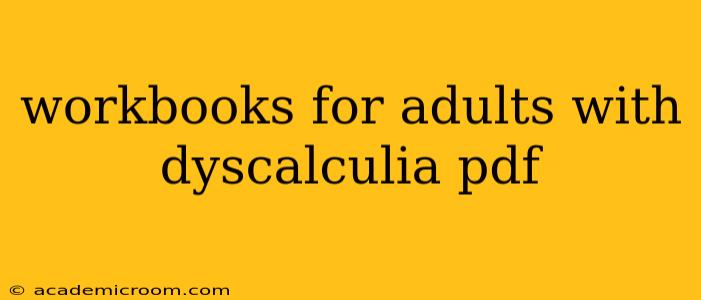Dyscalculia, a learning difficulty affecting mathematical abilities, can significantly impact daily life. While often diagnosed in childhood, many adults only recently discover they have dyscalculia. Finding appropriate support and resources can be challenging, but thankfully, several workbooks specifically designed for adults with dyscalculia can provide valuable assistance. This guide explores the benefits of such workbooks and points to the kinds of exercises you might find helpful. Remember, this information is for educational purposes and is not a substitute for professional diagnosis or therapy.
What are the Benefits of Workbooks for Adults with Dyscalculia?
Workbooks offer a structured and self-paced approach to improving mathematical skills. For adults with dyscalculia, this targeted approach can be incredibly beneficial, providing:
- Targeted Skill Development: Workbooks often focus on specific areas of difficulty, such as number sense, calculation, or problem-solving. This targeted approach allows for focused practice and improvement in areas needing the most attention.
- Increased Confidence: The structured nature of workbooks provides a sense of accomplishment as individuals progress through exercises. This can significantly boost confidence and motivation.
- Improved Understanding: Workbooks often employ different teaching methods and visual aids to help clarify concepts and make them more accessible.
- Self-Paced Learning: Individuals can work at their own speed, which is crucial for those with dyscalculia who may require more time to process information.
- Accessibility: Many workbooks are available in digital formats (though finding a PDF specifically designed for adult dyscalculia is less common than for children), making them easily accessible.
What Types of Exercises Might I Find in an Adult Dyscalculia Workbook?
While specific content varies, many workbooks incorporate exercises covering the following areas:
- Number Recognition and Sequencing: Activities focusing on identifying numbers, ordering them, and understanding their relative values.
- Basic Arithmetic Operations: Practice with addition, subtraction, multiplication, and division, often employing visual aids or alternative methods to support understanding.
- Money Management Skills: Exercises related to counting money, making change, budgeting, and understanding financial concepts.
- Time Management and Telling Time: Activities designed to improve understanding of clocks, calendars, and scheduling.
- Measurement and Estimation: Practicing with units of measurement and developing estimation skills.
- Problem-Solving Strategies: Exercises that focus on developing strategies to approach and solve mathematical word problems.
Where Can I Find Resources and Support?
While finding specific PDF workbooks designed for adult dyscalculia can be challenging, several avenues offer valuable resources:
- Occupational Therapists and Educational Psychologists: These professionals can provide assessments and recommend appropriate resources and strategies, including workbooks that might be suitable. They often have access to a wider range of materials than are readily available online.
- Online Resources and Support Groups: Many online communities and support groups exist for individuals with dyscalculia. These can provide valuable peer support and information about available resources.
- Educational Publishers: While finding adult-specific workbooks can be tricky, searching educational publishers specializing in learning difficulties might yield relevant resources.
Are there Specific Workbooks Designed for Adults with Dyscalculia?
Unfortunately, the market for workbooks specifically tailored to adult dyscalculia is less extensive than for children. Many resources marketed toward children might contain valuable exercises, but the presentation and context often assume a younger audience. It's important to carefully consider the content and whether it is appropriate for your level and needs. A professional assessment can be invaluable in guiding you toward suitable resources.
How Can I Choose the Right Workbook for Me?
When selecting a workbook, consider:
- Your Specific Needs: Identify your areas of greatest difficulty and choose a workbook that addresses those areas.
- Your Learning Style: Select a workbook that uses teaching methods and formats compatible with your learning style.
- The Workbook's Level: Choose a workbook that appropriately matches your current skill level to avoid frustration or discouragement.
This guide provides a starting point in your search for effective support. Remember, consistent effort and the right resources can make a significant difference in building confidence and improving mathematical abilities. Seeking professional guidance can be crucial in navigating this process effectively.
